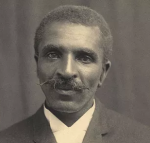In the early 1900s, George Washington Carver was a well-known scientist and innovator in the United States. Carver used peanuts, sweet potatoes, and soybeans to create countless items. He also supported agricultural education and crop rotation. He was born into slavery but has since become a symbol of American inventiveness and the power of education to change lives.
Early life
Probably in January or June of 1864, Carver was born. He was born a slave on Moses Carver's farm in Diamond, Missouri, but his precise birth date is uncertain. There isn't a lot of information available on George's father, Giles, who might have been a field worker who perished in a farming accident before George was even born. Mary was George's mother, and he had James as well as a number of sisters.
Few weeks after George was born, Confederate invaders stormed the property and abducted him along with his mother and sister. Only George was discovered and brought back to Missouri by a Moses Carver agent after they were all sold in Kentucky. George and James were raised by Carver and his wife Susan, who also taught them to read.
James eventually stopped attending the courses in favor of helping his foster father in the fields. Because George was weak and unable to work in the fields, Susan taught him how to help her in the kitchen garden and how to create straightforward herbal remedies. Plants piqued George's interest, and he quickly started experimenting with organic insecticides, fungicides, and soil conditioners. Farmers in the area started referring to George as "the plant doctor" because he could advise them on how to make their garden plants healthier.
Moses looked for a school that would let George enroll at his wife's urging. George frequently traveled the 10 miles to the Neosho, Kansas, School for African American Children. He relocated from the farm to Ft. Scott, Kansas, when he was around 13 years old, but then transferred to Minneapolis, Kansas, to attend high school. He worked in a nearby hotel's kitchen to pay for a large portion of his tuition. He created fresh recipes and entered them in regional baking competitions. He enrolled in college after earning his high school diploma from Minneapolis in 1880.
Tuskegee Institute
Carver got a letter from Tuskegee Institute's Booker T. Washington in April 1896. Tuskegee Institute was one of the earliest African American colleges in the country. This letter stated, "I cannot offer you money, position, or fame." The first two are yours. With your current position, you will undoubtedly attain the last. I'm now asking you to give up these items. In their place, I offer you work—hard work—the responsibility of raising people out of destitution, poverty, and waste and into full manhood. Your laboratory will have to be in your thoughts, and your department only exists on paper. Carver's pay at Iowa State was significantly lower than Washington's offer of $125.00 per month, and he would have two luxurious rooms to live in instead of one.
Carver was committed to using his expertise to support rural, underprivileged Southern farmers. He introduced the concept of crop rotation first. Carver chose to grow peanuts in the Tuskegee experimental fields because it was an easy crop to grow and had superior nitrogen-fixing capabilities to replenish soil depleted by growing cotton. By developing the Jessup Wagon, a horse-drawn school and laboratory for explaining soil chemistry, he brought his lessons to freedmen who had become sharecroppers. Farmers were thrilled with the abundant cotton crops produced by the cotton/peanut rotation, but they were less pleased with the enormous surplus of peanuts that accumulated and started to rot in local storage facilities.
Peanut products
After hearing the objections, Carver spent a full week alone in his laboratory working on new goods that could be made from peanuts. The market for peanuts exploded once he released these goods to the general public in a series of straightforward pamphlets. Carver is now credited for preserving the rural South's agricultural industry.
From his work at Tuskegee, Carver developed approximately 300 products made from peanuts; these included: flour, paste, insulation, paper, wall board, wood stains, soap, shaving cream and skin lotion. He experimented with medicines made from peanuts, which included antiseptics, laxatives and a treatment for goiter.

